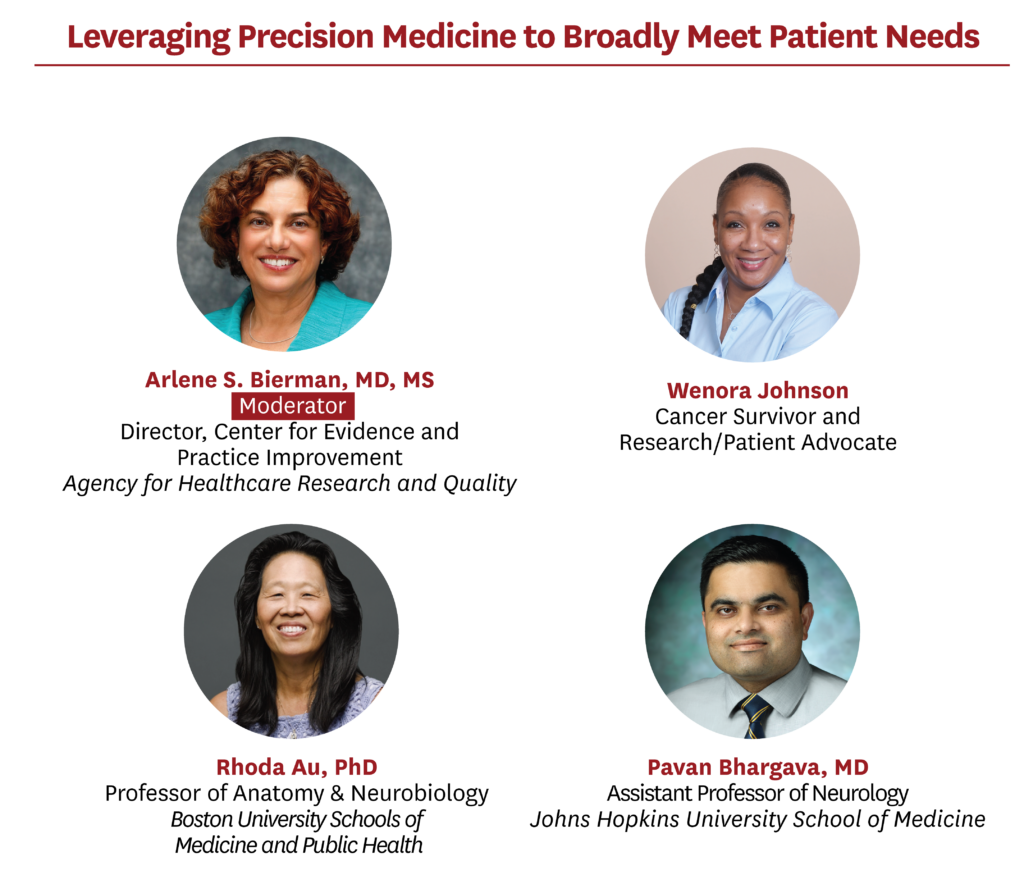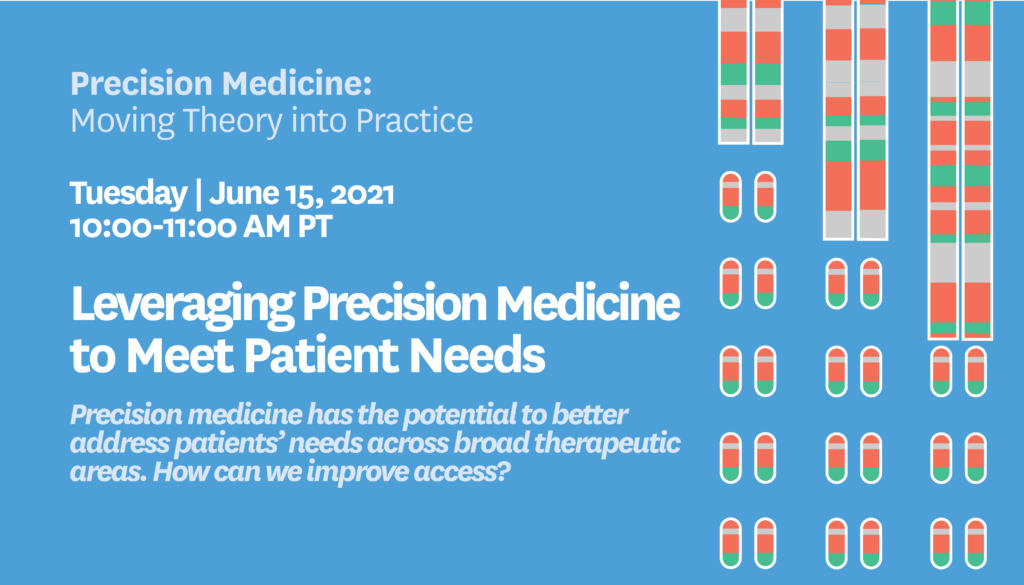Precision medicine promises to reduce adverse side effects and time-consuming trial and error processes, but many patients do not know what it is and providers struggle to leverage it effectively. Join Arlene S. Bierman, director of the Center for Evidence and Practice Improvement at the Agency for Healthcare Research and Quality in discussion with Wenora Johnson, a three-time cancer survivor and patient advocate, Rhoda Au, an expert on brain health, and Pavan Bhargava, an expert on multiple sclerosis, who will discuss how precision medicine can better address patients’ needs.
This webinar is part of a four-part series on precision medicine. Learn more:
- Event Date
- Tuesday, June 15, 2021
10:00 AM - 11:00 AM Pacific - Location
*Funding for this project was made possible in part by the Agency for Healthcare Research and Quality (AHRQ) (1R13HS026821-01). The views expressed in written conference materials or publications and by speakers and moderators do not necessarily reflect the official policies of the Department of Health and Human Services; nor does mention of trade names, commercial practices, or organizations imply endorsement by the U.S. Government.
 Participant Bios:
Participant Bios:
Arlene S. Bierman, MD, MS, (Moderator) is director of AHRQ’s Center for Evidence and Practice Improvement which consists of five divisions the consisting of five divisions the Evidence-Based Practice Center Program; the U.S. Preventive Services Task Force Program; Digital Healthcare Research; Practice Improvement; Healthcare Delivery and Systems Research; as well as the National Center for Excellence in Primary Care Research. Dr. Bierman is a general internist, geriatrician and health services researcher whose work has focused on improving access, quality and outcomes of health care for older adults with chronic illness in disadvantaged populations and has published widely in these areas. Dr. Bierman has also developed strategies for using performance measurement as a tool for knowledge translation, as well as conducted research to increase policymakers’ uptake of evidence. As tenured professor she held appointments Health Policy, Evaluation, and Management; Public Health; and Medicine; and Nursing at the University of Toronto, where she was the inaugural holder of the Ontario Women's Health Council Chair in Women's Health and a senior scientist in the Li Ka Shing Knowledge Institute at St. Michael's Hospital. She was principal investigator for the Project for an Ontario Women’s Health Evidence-Based Report Card (POWER) study, which provided actionable data to help policymakers and health care providers improve health and reduce health inequities in Ontario. Dr. Bierman has served on many advisory committees including the Geriatric Measurement Advisory Panel of the National Committee for Quality Assurance. Previously, she directed the Department of Ambulatory Care and Primary Care Internal Medicine Residency Program at Elmhurst Hospital in Queens, NY. She received her MD degree from the University of North Carolina School of Medicine in Chapel Hill where she was a Morehead Fellow. She completed fellowships in Outcomes Research at Dartmouth Medical School, and Community and Preventive Medicine at the Mount Sinai School of Medicine and also served as an Atlantic Philanthropies Health and Aging Policy Fellow/American Political Science Foundation Congressional Fellow.
Wenora Johnson is a 3x Cancer survivor, Research/Patient Advocate and Navy Veteran. Wenora began working closely with the organization Fight Colorectal Cancer (FightCRC) as a Research Advocate following her diagnosis of stage 3b colon cancer in 2011.
As a Lynch syndrome patient, Wenora also advocates for genetic testing and awareness. She serves on various panels and review boards to provide extensive feedback on her role as a patient and research advocate with organizations such as CAP (College of American Pathologist); Clinical Trials Curator for Fight CRC; FORCE (Facing Our Risk of Cancer Empowered) Volunteer and Board Member; a Consumer Reviewer for the DoD Peer Reviewed Cancer Research Program; a PCORI (Patient-Centered Outcomes Research Institute) Ambassador and Clinical Trials Panel Member; CPAT Member for the National Coalition for Cancer Survivorship (NCCS); CMS TEP Panel Member to review Medicare/Medicaid guidelines; AACR Scientist~Survivor Program - presenting a poster on financial toxicities and disparities among minority patients and a National Quality Forum (NQF) Cancer Standing Committee Member. She has written patient advocate blogs and participated as a guest speaker/panelist.
Wenora works in administration in the greater Chicagoland area and enjoys her motorcycle, reading and traveling with her family.
Rhoda Au, PhD, is Professor of Anatomy & Neurobiology, Neurology and Epidemiology at Boston University Schools of Medicine and Public and is a Senior Fellow at the Institute for Health Systems Innovation and Policy at the Questrom School of Business. She also serves as Director of Neuropsychology at the Framingham Heart Study, where she has been using technologies to develop digital cognitive biomarkers as surrogate indices of fluid and imaging biomarkers. She is also focused on building multi-sector ecosystems to enable solutions that move the primary focus of health technologies from precision medicine to a broader emphasis on precision brain health.
Pavan Bhargava, MD, is an Assistant Professor of Neurology at the Johns Hopkins University School of Medicine and a member of the Johns Hopkins Multiple Sclerosis Precision Medicine Center of Excellence. Prior to his current appointment, he completed a Neuroimmunology fellowship at the Johns Hopkins University supported by a Sylvia Lawry physician fellowship from the NMSS. His research interests include utilizing a variety of techniques to identify new diagnostic and prognostic biomarkers and to better understand the pathogenesis of MS. He has utilized metabolomics and lipidomics to identify new potential biomarkers of MS disease activity and is currently involved in multiple projects studying the utility of extracellular vesicle based approaches for identifying biomarkers of CNS inflammation and neurodegeneration. These approaches will allow for more individualized interventions targeting the metabolome and gut microbiome and allow precise monitoring of disease progression and treatment response.
He has authored over 50 papers in journals such as Science, Journal of Clinical Investigation, Brain, Neurology and the Annals of Neurology. His work is funded by multiple agencies including the National MS society, Race to Erase MS, American Academy of Neurology, Department of Defense, and the Conrad N Hilton foundation. He has received a John F. Kurtzke Clinician Scientist Development award from the American Academy of Neurology, the Marilyn Hilton Award for Innovation in MS from the Conrad Hilton Foundation and was recently named a Harry Weaver Neuroscience Scholar of the National MS Society.




You must be logged in to post a comment.